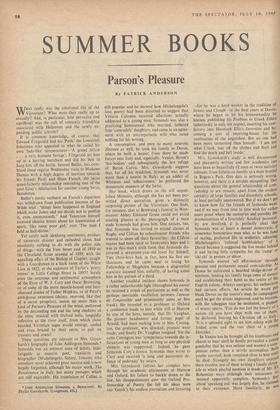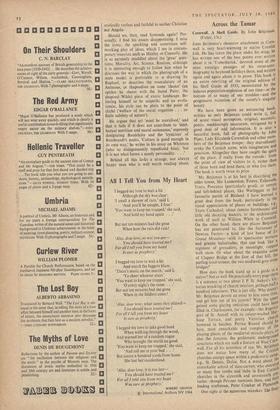SUMMER BOOKS
Parson's Pleasure
By PATRICK ANDERSON
WHAT really was the emotional life of the Victorians? What were they really up to sexually? And, in particular, how pervasive and significant was the cult of romantic friendship associated with Hellenism and the newly ex- panding public schools?
It is common knowledge, of course, that Edward Fitzgerald had his 'Posh,' the Lowestoft fisherman who appealed to what he called his own lady-like' temperament—'A grand fellow . . . a very humane Savage'; Fitzgerald set him up' as a herring merchant and did his best to keep him off the bottle. Samuel Butler, too, com- bined those regular Wednesday visits to Madame Dumas with a high degree of emotion towards his friends Pauli and Hans Faesch, the latter quasi-fatherly relationship reminding one of the poet Gray's infatuation for another young Swiss, Bonstetten.
Butler's poetic outburst on Faesch's departure was withdrawn from publication because of the Wilde trial: 'things have happened in England which make Jones and me decide not to publish it, even anonymously.' And Tennyson himself received abusive letters about his lamentation of spirit, 'like some poor girl,' over 'The man I held as half-divine.'
Yet surely such idealising sentiments, product of university cloister and cathedral close, had absolutely nothing to do with the police side of things—with the Vere Street raid of 1810 or the Cleveland Street scandal of 1889, with the appalling affair of the Bishop of Clogher, caught with a Guardsman in a back room of the White Lion in 1822, or the exposure of Taylor's 'pretty rooms' in Little College Street in 1895? Surely even the sensuous and sentimental atmosphere of the Eton of W. J. Cory and Oscar Browning, or of some of the more muscle-bound and hair- obsessed poems of Father Hopkins, or of Pater's ambiguous sweetness (dainty, reserved, like that of a secret perspirer), meant no more than a kind of Parson's Pleasure of the mind, mellowed by the descending sun and the long shadows of the elms, musical with Oxford bells, languidly reflective as the river itself, from which those bearded Victorian sages would emerge, cooled and even braced by their swim, to pull on trousers and coats?
These questions are relevant to Mrs. Gross- kurth's biography of John Addington Symonds.* Symonds was an eminent man of letters, inde- fatigable as essayist, poet, translator and biographer (Michelangelo, Sidney, Jonson), who somehow never achieved great success and is now largely forgotten, although his major work, The Renaissance in Italy, has many passages which are still enjoyable. His translation of Cellini is
* JOHN ADDINGTON SYMONDS, A BIOGRAPHY. By Phyllis Grosskurth. (Longmans, 45s.)
still popular and he showed how Michelangelo's love poetry had been distorted to suggest that Vittoria Colonna received affections actually addressed to a young man. Symonds was also a practising homosexual who married, fathered four 'comradely' daughters, and came to an agree- ment with an unsympathetic wife who cared nothing for his writing.
A consumptive, and prey to many neurotic illnesses as well, he took his family to Davos, where he built a house; from there he made forays into Italy and, especially, Venice, Byron's 'Sea-Sodom' and subsequently the last refuge of Baron Corvo. Mrs. Grosskurth suggests that, for all his erudition, Symonds was never more than a tourist in Italy; as an addict of Whitman and 'adhesiveness,' he preferred the democratic manners of the Swiss.
Her book, which draws on the still unpub- lished Memoirs, although she has not been per- mitted direct quotation, gives a distinctly surprising picture of the Victorians. One finds, for instance, that at Browning's funeral in West- minster Abbey Edmund Gosse could not avoid stealing glances at the photograph of a male nude Symonds had given him. One notices, too, that Symonds was invited to attend classes at Rugby and Clifton by schoolmaster friends who wanted to show off their favourites: the Clifton master had been tutor to Tennyson's boys and it was in thi4 man's sixth form that Symonds dis- covered a seventeen-year-old lover for himself. Two choir-boys had, in fact, been his first en- thusiasms and he came near to losing his Fellowship at Magdalen because a disgruntled associate accused him, unfairly, of having aided him in his pursuit of a third.
Another youthful incident shows Symonds in a rather unfavourable light (throughout his career he retained a streak of puritanism as well as the perhaps inevitable vacillation between l'amour de l'impossible and promiscuity more or less frank). He revealed to a professor at Oxford a confidence made to him while still at Harrow by one of the boys, namely, that Dr. Vaughan, the pioneer headmaster and former pupil of Arnold, had been making love to him. Coning- ton, the professor, was shocked; protests were made; and finally Dr. Vaughan resigned. Yet the same Conington was 'sympathetic towards the in- fatuations of young men as long as any physical element was suppressed.' Indeed, he gave Symonds Cory's Ionica. Symonds then wrote to Cory and received 'a long and passionate de- fence of pederasty' by return.
Mrs. Grosskurth follows her complex hero through his academic attainments at Harrow and Oxford, his failure to buckle down to the law, his disappointment over the Oxford Pro- fessorship of Poetry (he felt his ideas were too 'Greek), his endless journalism and lecturing —for he was a hard worker in the tradition of Jowett and Clough—to the final years at Davos, where he began to let his homosexuality be known, publishing his Problem in Greek Ethics (admittedly in only ten copies), inserting his case- history into Havelock Ellis's Inversion and be- coming a sort of receiving-house for the confessions of the anguished. But no one had been more tormented than himself: 'I am not what I look, tear off the clothes and flesh and find the death and hell inside.'
Mrs. Grosskurth's study is well documented and pleasantly written and few academics can have been so beautifully (if once or twice naïvely) tolerant, from fellatio en faonille to a male brothel in Regent's Park. One date is seriously wrong, however, and there is a notable misspelling. Our questions about the general relationship of c001- radeship to sex remain, apart from the evident carnality of large families and disorderly schools, at least partially unanswered. But if we don't get to know how far the friends of Symonds went, and if we may from time to time wish for rather more proof where the memories and possibly the dramatisations of a feverishly 'Acadian' personal- ity are involved, it is perfectly clear that Symonds was at heart a decent democratic, if somewhat humourless man who, as he was fond of saying, preferred life to aesthetics, admiring Michelangelo's 'colossal hobbledehoy' of a David because it suggested the live model behind it and having little sympathy for the 'camp' or `chi-chi' in gesture or ddcor. Symonds wanted 'self effectuation' through genuine and permanent sexual comradeship. At Davos he cultivated a bearded sledge-driver or nineteen, lending his family large sums of moneY and establishing their hotel as the centre of the English colony. Always energetic, his enthusiasm had curious effects. An article he wrote Ptl; bleak Davos on the tourist's map, he campaign" until he got the drains improved, and he became, with the toboggan race he instituted, a pioneer of winter sports. 'You do not feel the beauty Of a, nation till you have slept with one of then, he declared, bearing his Christian off to ItalY• 'It is a splendid sight to see him asleep with the folded arms and the vast chest of a young Hercules . . In Venice too he brought all his kindliness and charm to bear until he finally persuaded a young gondolier that he was serious and wanted a com- panion rather than a servile accomplice. Hot!' youths married; both remained close to him until he died. Strangely his own daughters enjoYed these crushes, one of them writing a family chroo,- icle in which playful mention is made of Mr. 5 s Bohemian ways although their innocence re- mained apparently complete. Symonds's feel. about 'speaking out' was largely due, he claimed, to their existence. More familiarly, he Was
erotically restless and faithful to neither Christian nor Angelo.
Should we, then, read Symonds again? Per- sonally, I find his essays disappointing. I miss the irony, the sparkling and sometimes self- mocking play of ideas, which I see in contem- porary essayists such as Huxley or Connolly. He is so earnestly muddled about the 'great' ques- tions, Morality, Art, Science, Realism, although it is interesting enough to follow him when he discusses the way in which the photograph of a male model is preferable to a drawing by Raphael, or describes the musculature of an Antinous, or rhapsodises on some 'choice' (an epithet he shares with the hated Pater, the despised Wilde) piece of exotic landscape. Be- lieving himself to be scie,ntific and art evolu- tionist, his style can be plain to the point of clichd ('welfare of the social organism . . . in- finite subtlety of nature').
He argues that art 'must be moralised,' and that it fails if it does not contribute to 'intel- lectual nutrition and moral sustenance,' expressly denigrating Baudelaire and the 'cynicism' of Rembrandt's nudes. 'Culture is good enough in its own way,' he writes in his essay on Whitman (who so disingenuously repudiated him), 'but it is not what forms a manly personality. . .
Behind all this lurks a strange, not always happy man who is well worth reading about.











































 Previous page
Previous page